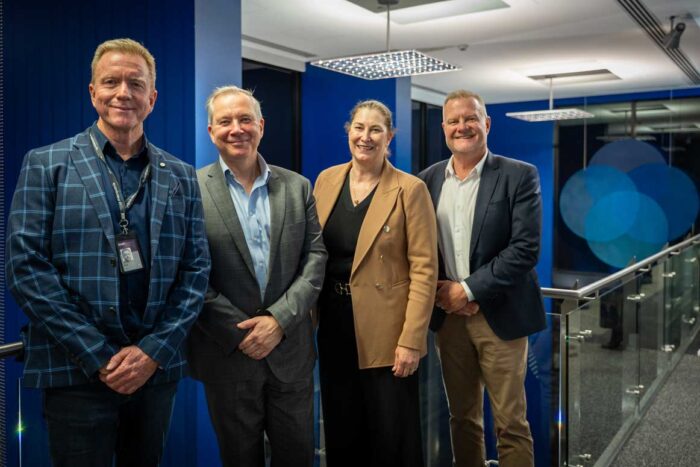Low-Code AI Agent Builders: Managing Data Risks

Building an AI agent doesn’t have to be a long or complex project. Even if your team is short on time or development resources, you can still get started (and stay compliant) by choosing the right tools and approach.
Low-code platforms make it easier for more teams to build task-specific agents and automate everyday processes. However, with that flexibility comes risk. Data sovereignty, security controls, and infrastructure planning need to stay front of mind, especially for teams working within regulated sectors.
This article explores how low-code AI agent builders work, where the risks are, and how to deploy them in a way that keeps your data safe and your organisation compliant.
Table of Contents
- What are low-code AI agents?
- Sovereign data vs regional data, what’s the difference?
- AI agents and sovereign data
- Examples of low-code AI agent builders
- What industries benefit from sovereign AI?
- Why organisations are opting for private AI agents
- How Macquarie Data Centres can support your low-code AI setup
What are low-code AI agents?
While AI processing is often handled off-platform or offshore, there are ways to configure these tools to meet local compliance needs. We’ll walk through a practical approach shortly to help you stay in control of your sensitive data.
Low-code AI agents are tools built on platforms that let you create AI-powered workflows without writing much code. Instead of complex programming, you use visual editors and pre-built building blocks to design how the agent works. This makes it easier for teams to build and launch AI tools without needing deep technical skills.
Examples of low-code AI agent builders
Many platforms now offer low-code tools for building AI agents, but not all keep your data onshore by default. Below are the top low-code AI agent builder platforms and what teams can do to configure them to meet data residency requirements in Australia.
| Top low-code AI agent builders | How to meet data residency requirements |
| Salesforce’s Agent Builder | |
| Microsoft Power Platform | |
| ServiceNow | |
| Zoho Creator | |
| Google AppSheet |
Please note that while public cloud regions can offer data residency, they do not guarantee data sovereignty. Even hosting your workloads in an Australian zone doesn’t mean your data will stay entirely within Australia. In fact, even the major hyperscale providers can’t give a 100% assurance that your data won’t move offshore. If your business needs full data sovereignty, reach out to our team, we’d be happy to help.
If you need to go beyond basic data residency and ensure true sovereignty, consider partnering with a sovereign data centre provider like Macquarie. We keep all data storage, processing, and access entirely within Australian jurisdiction, which is ideal for regulated industries and sensitive workloads.
AI agents and sovereign data
Low-code AI agents often rely on external models and APIs to generate responses, access knowledge, or complete tasks. However, if those models are hosted offshore, your data can leave Australian jurisdiction without warning. This is where sovereign data management can help.
Sovereign data is information that stays within Australia and is protected by Australian law. This includes any data passed through LLM APIs, cloud integrations, or model endpoints based outside Australia. If processing happens offshore, even for a split second, your organisation may be exposed to risk under the Privacy Act.
Keeping your data centre onshore supports compliance, gives you greater control, keeps customers happy, and reduces exposure to foreign access or influence.
Private AI can be a great option for businesses that want to keep their data secure. Instead of relying on public cloud infrastructure, private AI lets you run models, like LLMs, in safe, isolated environments you have full control over.
What industries benefit from sovereign AI agents?
AI is only as useful as the data it learns from. When models rely on global or foreign datasets, they often miss the mark on local context, from language and demographics to cultural norms.
Training your AI systems on sovereign Australian data trains the model on how Australians speak, act, and make decisions. That means more accurate outcomes, better adoption, and higher trust, especially in high-stakes environments.
These are some of the industries that can benefit the most from sovereign AI.
Healthcare
Medical baselines in Australia differ from those in the US or Europe, from BMI ranges to diagnostic guidelines. If a clinical AI assistant is trained on American data, it could lead to poor recommendations or missed risk factors for Australian patients.
Financial services
Risk appetite, spending patterns, and credit frameworks vary by region. AI models trained on foreign financial data may misread local risk signals or make inaccurate predictions.
Public sector and emergency services
AI agents that support citizen services, crisis response, or education need to understand how Australians communicate. Local language, place names, and social norms matter, especially when accuracy and clarity are critical.
Aboriginal and Torres Strait Islander services
Global datasets often fail to reflect the diverse cultural, linguistic, and historical realities of Aboriginal and Torres Strait Islander communities. Sovereign data allows AI systems to better support these communities by recognising the correct context, respecting cultural knowledge, and avoiding bias.
Why organisations are opting for private AI agents
As low-code AI tools become more common for building chatbots and automation, more organisations are choosing to run private AI, where the models and data stay on infrastructure they control. Here’s why it’s becoming a popular choice:
- Meets compliance needs: Sectors like government, banking, and healthcare often need to keep data onshore to meet rules like SOCI, CPS230, or GDPR.
- Keeps data secure: Public AI tools may log or reuse your data. Private AI keeps customer info and business IP safe.
- Lower latency, stable costs: Running models locally avoids API charges and generates faster responses. This is ideal for real-time use in retail, healthcare, or mining.
- Custom control: You can fine-tune models, add safety filters, and shape responses to match your business.
- No vendor lock-in: Private AI works with the systems you already use, without locking you into one provider’s tools or pricing. You can still integrate this with various platforms like Salesforce, SAP, Dynamics, and more.
In short, private AI gives you more control, better privacy, and a setup that grows with your business.
How Macquarie Data Centres can support your low-code AI setup
Public AI tools work for some, but not all. If your team needs more control, private AI offers a secure, compliant way to deploy AI agents, especially in regulated industries.
The good news is that with a hybrid setup, you can host your AI agent inside trusted infrastructure and call out to models like OpenAI or Claude only when needed. You stay in control of when, how, and what data is shared. Here’s how.
Run your AI agent on infrastructure you control
You can run your AI agent in a secure environment hosted inside Macquarie Data Centres. This gives you full control over how it operates and where your data is stored.
With this setup, you can:
- Manage workflows, business rules, and agent memory directly.
- Integrate proprietary data, customer records, and internal systems like Salesforce, SAP, or legacy apps behind your firewall.
- Apply your own guardrails, including data masking, filters, and rate limits.
This approach helps you keep sensitive information secure and aligned with your compliance requirements.
Use public AI models via an API
You can also connect your private AI agent to public models like OpenAI, Claude, or Gemini for specific tasks such as summarisation, questions, sentiment analysis, or code generation.
Prompts are sent to the model via API, and responses are returned in real time. Before anything leaves your system, you can apply filters to scrub or anonymise the data, making sure only what’s necessary is shared. This approach gives you the flexibility of public AI, while keeping your core logic and sensitive data protected.
Want to explore deployment options for secure AI workloads? Contact our team to learn more.
About Macquarie Data Centres
Macquarie Data Centres are trusted by hyperscalers, multinational enterprises, ASX-listed companies and 42% of the Australian Federal Government. All our sovereign data centres are part of the nations critical infrastructure and are Certified Strategic by the Australian Government. Our flagship Macquarie Park Data Centre Campus in Sydney’s north zone is purpose-built to support the growing demands of AI and cloud in Australia’s digital economy.
Want to learn more about our sovereign data centres? Browse the links below.
- Macquarie Park Data Centre Intellicentre 2
- Canberra Data Centre Campus Intellicentre 4
- Canberra Data Centre Campus Intellicentre 5
- Sydney CBD Intellicentre 1
- Sydney CBD Intellicentre 2
- Sydney CBD Intellicentre 3
Alternatively, you can read up on our blog for all the latest insights into AI and data centre technology. Or contact us to ask us some questions. We’re happy to offer our advice.
Read more about our colocation services in Sydney and Canberra.
Read more about our data centres in Sydney, Macquarie Park, and Canberra.




